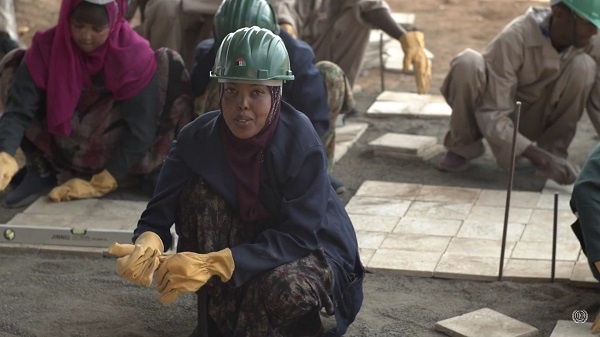
Partnership for improving prospects for forcibly displaced persons and host communities (PROSPECTS), a project by the International Labour Organization (ILO)
ILO and its partners have introduced tailored courses, empowering refugees, and host community members to gain professional skills and pursue meaningful careers.
JIGJIGA (ILO News) – To equip host and refugee community members with professional skills, the International Labour Organization (ILO) in collaboration with the Somali Regional Skills and Job Creation Bureau, Jigjiga Polytechnic College (JPTC) and The Lutheran World Federation (LWF) introduced a range of in-demand vocational trainings courses in Ethiopia.
Shukri Tahir, a 30-year-old Ethiopian, completed her secondary school in Dire Dawa and went on to study Construction Management Technology at Addis Ababa University. After graduation, among the range of skill trainings available, she chose to enroll in the cobblestone surfacing training. In a class full of men, her presence did raise a few eyebrows. She took a three-month specialized training in cobblestone surfacing organized by German Agency for International Cooperation (GIZ) and the Federal Government and had since been a trainer at the JPTC. Till date, she has trained eleven batches of youths on cobblestone surfacing.
“It is considered as a men-only profession in our region. Also, the job is considered as hard labor as you work under the scorching heat and have to lift heavy materials,” said Shukri. She was pointed by many that she is a woman and not fit for this job, but she was determined to prove her capabilities. She added, “The training taught me that cobblestone pavement is not just about strength, but it is more about knowing the technique. It does not really matter if you are a man or woman.”
Shukri completing the cobblestone surfacing training set a new benchmark for the college and the community. To encourage more women to join the trade, she was offered a job to become a trainer for the next batch.
“My presence did inspire many women candidates. To an extent that the cobblestone surfacing training department witnessed the highest enrollment of women candidates compared to other trades this year. A few girls did try to switch their trades to soft skill trainings like information technology, accounting or business studies in between, but I managed to address their concerns and encouraged them by explaining labor market opportunities for this trade,” explained Shukri.
Ugbaad Ibrahim (21), a Somali refugee, one of Shukri’s Cobblestone Surfacing Training students at JPTC said, “We always have distorted views of professions which we are not engaged in. What I felt was an impossible task for women to do at first, seems doable now for us after the training. I am eager to complete my graduation and find a job now.”
Among this year’s candidates, Nimo Rirash (23), another Somali refugee, is a trainee ho has made path-breaking choice to learn aluminum works. “I received backlash from my own mother. She scolded me for choosing training in hard field. She tried to convince me that women never find jobs in such trades. I want to prove her wrong. If I won’t find a job, I know I can start my own business with this skill,” said Nimo, who is rising to be a top-performing student of her class.
The ILO introduced these trainings through the Government of the Netherlands supported Partnership for improving prospects for forcibly displaced persons and host communities (PROSPECTS) program. Realizing the limitations and challenges for host and refugee communities in accessing accredited skills and decent work opportunities, the program introduced tailored courses on cobblestone pavement laying, aluminum works and water supply installations.
Jean-Yves Barba, Chief Technical Advisor, ILO PROSPECTS Ethiopia explained, “We carefully chose the trades based on our research. We invested in upskilling teachers by providing them interface with the latest industry practices, developing customized courses for students based on labor market analysis and now we are planning to extend entrepreneurship and business development trainings to these students. We do encourage this change in gender norms in vocational trainings. It will help addressing gender stereotypes and create more employment opportunities for refugee and host community members.”
Till date 58 candidates have completed vocational training courses through ILO supported intervention in Somali region, among them 11 are women, while 26 are refugees.
Luladay Aragaw, former National Program Officer, ILO PROSPECTS Ethiopia, said, “By partnering with the government departments, universities and colleges we are aiming to achieve a systemic change, which will sustain and continue to upskill host and refugee communities in the region. We are working in close coordination with employer’s organization to support the trainees to avail work-based learning and employment opportunities. We also intend to introduce financial inclusion opportunities for candidates who wish to develop their own businesses.”
Sources: ILO
